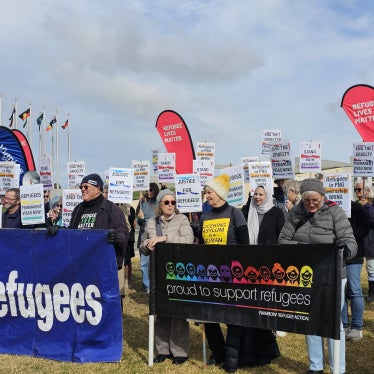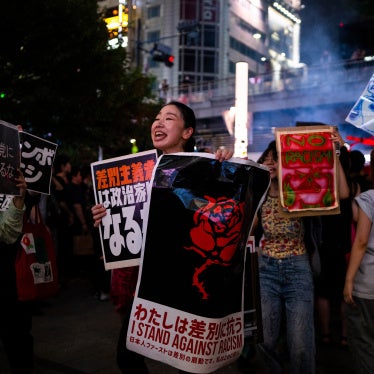(New York) --- As the European Union and China meet for a summit in Beijing on December 21, Human Rights Watch called on the Prime Minister of Finland, Mr. Paavo Lipponen, and the President of the European Commission, Mr. Romano Prodi, to ensure that the development of economic relations is matched by consistent pressure on China to comply with its international human rights obligations.
"The European Union must couple its efforts to make China a more reliable trading partner with serious parallel pressure for significant improvements in human rights," said Lotte Leicht, Brussels Office director of Human Rights Watch. "China must go beyond opening its markets to opening its jails, easing restrictions on the press and the Internet, and protecting the rights of workers. The dialogue can be most beneficial for human rights in China if it is combined with effective, sustained pressure for greater political as well as economic freedoms in the country."
The summit is expected to focus on the EU's negotiations with China on its membership in the World Trade Organizatin (WTO). But Human Rights Watch noted that there has been a serious deterioration in human rights conditions in China since the last EU-China summit, including an intensified crackdown on pro-democracy activists, the banning of the Falun Gong movement, and repression in Tibet and Xinjiang.
The international human rights monitor called on the EU to insist that Chinese leaders take concrete, meaningful steps to improve human rights. At a minimum, the Chinese should:
- ratify the two United Nations human rights treaties it has signed, the International Covenant on Civil and Political Rights and the International Covenant on Economic, Social and Cultural Rights;
- begin the process of dismantling the huge system of "reeducation through labor" which allows officials to sentence thousands of citizens to labor camps each year for up to three years without judicial review;
- open up Tibet and Xinjiang to regular, unhindered access by U.N. human rights and humanitarian agencies, foreign press, and independent monitors;
- review the sentences of more than 2,000 "counter-revolutionaries" convicted under a provision repealed in 1997, with a view towards releasing most of them.
- lift the official ban on Falun Gong and release all those members of Falun Gong who have been arbitrarily detained or sentenced to labor camps.
A critical source of external pressure on Beijing is the United Nations Commission on Human Rights, which convenes in Geneva for its next session on March 20, 2000. In the past, China has shown that it can be extraordinarily sensitive to possible condemnation by the Commission. In 1995, a resolution on China came within one vote of passing, and since then Beijing has expended major effort worldwide to keep any critical resolution off the Commission's agenda -- including by threatening to cut off trade deals or investment opportunities to governments that might support action.
Human Rights Watch called on the EU to join the U.S. and other major trading partners in sponsoring a resolution on China at next year's U.N. meeting. But if action in Geneva is to have any chance of success next year, a decision to sponsor a resolution and begin high-level lobbying to line up support is needed now.
"Beijing's chief trading partners must insist that China's compliance with international trade rules be accompanied by respect for international human rights rules," said Ms. Leicht. " That should be the key message delivered by the EU in Beijing during its high level talks."







